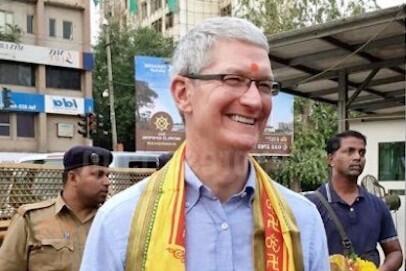All gravy for Cook’s iPhone manufacturing?
Article By : Sufia Tippu

Apple CEO Tim Cook's efforts may have paid off with Bengaluru announcing iPhone manufacturing to start soon. Is it all gravy for Apple from here on?
When Tim Cook visited India last year, bedecked in Indian attire with a bright yellow silk stole around his neck and traditional vermillion on his forehead, he had invoked prayers to the elephant-headed god, Ganapathy, considered to be the remover of all obstacles. His prayers have been answered with the state government of Karnataka issuing a press release welcoming Apple's proposal "to commence initial manufacturing operations" in the state.
If all goes well, India will be the third country globally to assemble iPhones, an indication of how important the country has become for Apple. Although there are reports that Apple has finalised Bengaluru as the assembling location, neither Apple nor the government are willing to confirm the development.
The government announcement, signed by state IT minister Priyank Kharge, simply said Apple's intentions to manufacture in Bengaluru "will foster cutting edge technology ecosystem and supply chain development in the state, which are critical for India to compete globally." Sparse on timeframe, capacity and the types of products to be manufactured, the press release sets the expectation for the production to begin in June. Taiwan's company Wistron, an OEM for Apple, will manufacture the iPhones.
Some dailies have reported government sources that accommodating Apple's demands for tax holidays will be increasingly difficult under the upcoming rollout of the GST regime, which subsumes various taxes and duties.
While the focus has been on tariffs, Apple is likely to face other challenges to a success story in India.
While the focus has been on tariffs, Apple is likely to face other challenges to a success story in India.
Competition ahead
Apple most recently recorded 2.5 million iPhones shipped in India, a small fraction of the 29 million smartphones that Samsung, India’s market leader sold. Like elsewhere, Samsung has several models at various price points, discount offers as well as exchange offers and more importantly, most of its handsets have dual SIM slots—a sought-after feature in India. Yet, iPhones, especially the latest versions, are considered a luxury at over US$1000.
Says Tim Bajarin, president, Creative Strategies, Inc., a Silicon Valley based market research firm, “By manufacturing in India, it allows them to get past any legal and tariff restrictions and gives them a better foothold to build iPhones for the Indian market. Apple see India as its next major place to expand the iPhones presence and this would help them toward reaching that goal.”
Building an ecosystem
The lack of a viable ecosystem will also prove equally challenging for Apple. The company uses a fairly complex supply chain. Parts for various Apple products are mostly manufactured by third parties across 28 countries. It has 766 suppliers, of which 346 are in China, 126 in Japan, 69 in the United States and one—a unit of Flextronics—in Tamil Nadu.
"There is no component ecosystem in the country besides what Samsung has done in India. With Apple's China sales slowing down, it's opportunity India, and Apple might look at a different SKU, distribution and sourcing model to make it affordable to millions of aspiring customers," said Navkendar Singh, senior research manager – mobile devices research, India and South Asia, at market researcher IDC.
Apple has risen from the ashes before and will likely have learned a few lessons along the way. “Apple could buy some small app companies, but it is more likely that they would expand their developers programme more aggressively in India and could perhaps even have a dedicated developers conference just for India’s developers. It could also grow through partnerships, but Apple would really want more home-grown apps in their store to give more strength to its position in India,” Bajarin noted.
Last week, Tim Cook during the company's earnings call he said “Despite the demonetization move in India that created lots of economic pressure last quarter, despite that, we had all-time record revenue results, and so we were very happy about that. I think in the longer term, it’s a great move, and I feel really good about how we’re doing there. We are in discussions on a number of things, including retail stores, and fully intend to invest significantly in the country and believe it’s a great place to be.”